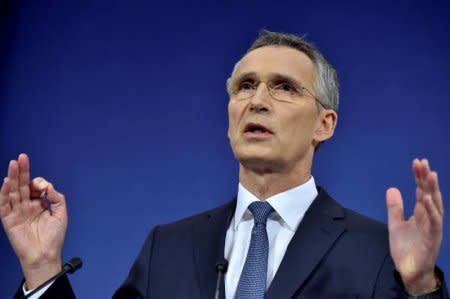NATO chief Stoltenberg wins extended term to late 2020

Thomson Reuters
By Robin Emmott
BRUSSELS (Reuters) - NATO allies extended Jens Stoltenberg's term as secretary-general of the Western military alliance until late 2020 on Tuesday, giving the former Norwegian prime minister a rare six-year mandate in the top job.
Stoltenberg, who took up the post on Oct. 1 2014, will now step down two years later than planned on Sept. 30 2020, after strong support from Germany and the United States, NATO's dominant power, which has welcomed his efforts to increase defense spending in Europe.
French President Emmanuel Macron and British Prime Minister Theresa May both congratulated Stoltenberg on Tuesday.
If he completes his term as the alliance's top civilian, Stoltenberg would be the first NATO chief to serve a six-year term since Germany's Manfred Worner, who died in office in 1994.
The post has always gone to a European and at a time when the Trump administration is at odds with many of its allies on a host of foreign policy issues, Stoltenberg is seen by many as a skilful operator and consensus-builder.
Stoltenberg, 58, who visited Donald Trump at the White House in April and hosted the U.S. president in Brussels in May, said transatlantic ties would be a priority for the remainder of his term.
"My main task is to maintain that unity," he told reporters, referring to relations between North America and Europe.
Stoltenberg has also struck a more conciliatory tone towards Moscow than his Danish predecessor Anders Fogh Rasmussen, even as he has overseen NATO's biggest military build-up since the end of the Cold War, prompted by Russia's 2014 seizure of Crimea and its support for separatists in eastern Ukraine.
"I believe in dialogue with Russia but I am also here to ensure security in Europe," he said.
NATO, seen by some as a Cold War relic until the Crimea annexation, has gained new relevance as the West confronts a resurgent Russia, state-sponsored computer hackers, security threats on its borders and militant attacks on European cities.
Stoltenberg has also thrown his weight behind diplomatic efforts to contain the North Korea nuclear crisis, visiting U.S. allies Japan and South Korea in October.
(Reporting by Robin Emmott; Editing by Andrew Heavens)
See Also:

 Yahoo News
Yahoo News 
